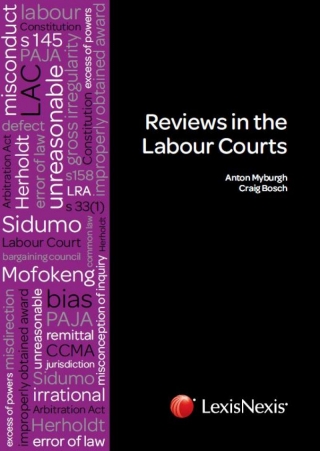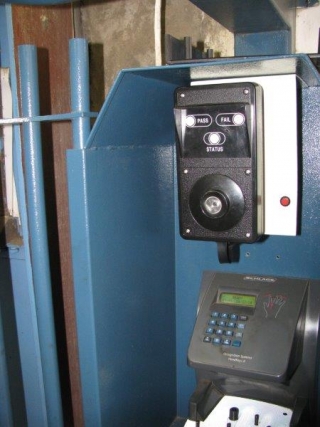Invaluable Book Released for Labour Law Practitioners
The Labour Court roll is dominated by review applications. A review application is the result of a party’s unhappiness with the award from the CCMA or bargaining council. The disgruntled party’s recourse is to launch an application in the Labour Court for the review of the award.
A new legal title from LexisNexis South Africa addresses these proceedings. Reviews in the Labour Courts provides excellent guidance for labour practitioners and is a must-have manual for all labour lawyers, advocates, judges, CCMA commissioners, bargaining council arbitrators, unions, HR/IR practitioners, in-house counsel, lecturers and post-graduate students. The authors are two of South Africa’s leading labour law advocates, Anton Myburgh SC and Craig Bosch.
The Constitutional Court, in the leading judgment of Sidumo, set out the test on review: “Is the decision reached by the commissioner one that a reasonable decision-maker could not reach.” Whilst the ‘Sidumo test’ appeared narrow, the Constitutional Court found that CCMA awards constitute administrative action and so the constitutional standard of reasonableness suffuses Section 145 of the Labour Relations Act. The result is a massive body of case law that continues to grow, making it difficult for busy practitioners to keep pace.
In his foreword to Reviews in the Labour Courts, Honourable Justice John Murphy said Reviews in the Labour Courts would serve as a practioner’s manual. “Every now and then a law book is written that fills a notable gap in the bookshelves of practising lawyers. This is such a book,” he said. “The arguments are meticulously researched, logically presented and practically relevant. In that way, in addition to its value as a scholarly work, Reviews in the Labour Courts will serve as a practitioner’s manual. The practice of labour law before the labour courts will profit immensely from practitioners embracing the practical teaching of this seminal work.”
Reviews in the Labour Courts will be launched at the SASLAW Annual Conference in Johannesburg on 22 July 2016 and is available through the LexisNexis online bookstore https://store.lexisnexis.co.za/categories/products/reviews-in-the-labour-courts-skuZASKU9780409044850/details at a cost of R800.00 inclusive of VAT and excluding delivery.
About the Authors
Anton Myburgh, BJuris LLB (UPE): Anton is a senior counsel at the Johannesburg Bar (Sandton); adjunct professor of law at NMMU; past national president of SASLAW; sometime acting judge of the Labour Court.
Craig Bosch, BA LLB (Stell) LLM (UCT): Craig is an advocate at the Cape Bar; research associate at NMMU; former senior lecturer in labour law at UWC, former senior commissioner of the CCMA and bargaining council panellist.
Alcohol Testing - A Health and Safety Measure which benefits all of us
Over R240 billion equivalent to 10% of the country’s GDP is the amount of money the country loses due to alcohol abuse annually. This is according to a study carried out by the South African Medical Journal in 2009. This enormous figure represents the estimate sum of all the different dimensions through which alcohol abuse deducts from us. From workplace incidents that cost and maim lives, to absenteeism, fraudulent leave and reduced productivity. Yet even with this mammoth loss, most employees would gladly not take any alcohol and illicit substance tests in their places of work.
The amount of money that alcohol and substance abuse costs South African businesses and their respective employees is huge and could otherwise have been better spent. Over and above this R240 billion loss, the emotional scars that alcohol imprints on families and loved ones are even more horrific. Breadwinners and spouses die or get maimed as a result of the effects of alcohol abuse in the workplace on a daily to weekly basis. For this reason alone one would expect that the behaviour of employees would change.
In South Africa employees are the primary beneficiaries of legislation that provides for health and safety standards in the workplace. The Law that governs general workplace safety is the Occupational Health and Safety Act of 1993 (OHSA) and in the Mining Industry, safety is governed by the Mine Health and Safety Act. Although the OHSA was poorly written and has often been misinterpreted, it is the Law that we have to work with and it has been in effect for over two decades.
The OHSA directs how safety is enforced and over time, as with all legislation, the act has been amended to suit the needs of evolving workplaces. In short, its objective is to “provide for the health and safety of persons at work.” The act empowers employers to formulate policies that will ensure that employees work in safe conditions that do not threaten their health in any way. These policies are the available instruments that all employees should be able to openly discuss with their employers on a continuous basis. The policies may deal with and include issues like substance abuse, alcohol testing, safety resources, training and frameworks for action in response to substance abuse, intervention and counselling.
Whoever the employer is in whatever industry, the company policies relating to health and safety must always have the same goal – to create a safe and healthy work place. Whatever the situation, the welfare of employees is of paramount importance and how an employer and employee interact, negotiate and agree on policies can ultimately make the difference between life and death. Through it all, the policies of companies and the legislation it is formulated under and a number of constitutional statutes all have to be observed faultlessly.
Some company policies provide for voluntary alcohol testing, while other companies test all employees entering their place of work. In industries which include mining, manufacturing plants that use heavy machinery, maritime and the transport space, alcohol testing is often mandatory. As a prerequisite to the operation of machinery, all employees must be sober and tested. For these industries testing is usually done at the entry point at the mine shaft or plant or factory using an automated AlcoScan Entrance Breathalyzer System (EBS).
AlcoScan Entrance Breathalyzer Systems can be connected to turnstiles where a biometric scanner, data logger and a camera can work hand in hand to identify an employee, capture a test result and log it against their record in the time and attendance database. If the EBS detects alcohol in your breath, you are automatically prevented from entering the premises. From this point, the company policies will then direct proceedings, whether it calls for a second confirmatory test or suspends the employee for the day without payment or calls for disciplinary action. In all instances, there is a zero tolerance of alcohol which when defied will be met with stringent disciplinary action as being under the influence of alcohol in the work place will threaten the lives of others as well as of that individual.
An innovative method to curb alcohol consumption within the workplace is to also ensure that employees are tested on their way out of the company premises. There have been a number of instances I have dealt with where employees have passed the breathalyser test when entering, but have then consumed alcohol during the day and beer cans have been found within the operating environment. Generally when employees leave work, there are no measures put in place to detect if there is alcohol in their breath. Testing for alcohol on the way out ensures that those that smuggle alcohol into premises are dealt with to preserve the safety of others. The barrier of outbound testing using the very same EBS used for inbound testing acts as a deterrent for all those who think they will be able to consume alcohol on site and get away with it.
For the transport industry, companies can opt for a breathalyzer to be installed for drivers to test before they start the vehicle. These Alco-Interlocks are connected to the ignition such that the vehicle will only start when the breathalyzer registers a pass confirming no alcohol has been detected in the breath. These breathalyzers may also be connected to a remote logging system and database that registers the test against the driver’s name. Together with the breathalyzer in the truck, a camera and ID tagging system can be installed to ensure that the test result registered is for the correct individual and not a passenger.
The importance of training and education about substance and alcohol abuse in the workplace cannot be emphasized enough. Unless adequate training and education is performed about substance abuse and why being under the influence of alcohol should never be mixed with heavy machines, employees will continue to operate vehicles and machines under the influence of alcohol.
It is also important to note that alcohol abuse puts more than just one person at risk. In a work environment, alcohol abuse affects a cluster, a department and the entire company negatively. An inebriated crane operator could make one wrong move due to impaired judgment as a result of being under the influence of alcohol and it can result in the maiming or death of team members he or she may be working with. A prime example: the recent and untimely death of Total CEO Christophe de Margerie by plane crash in Moscow was reportedly blamed on a drunk snow plough operator.
Misfortunes resulting from alcohol abuse and misuse do not distinguish who is affected and can cost the life of anyone from the ground up to the CEO. Therefore, it is imperative to keep in mind that alcohol abuse and misuse in the workplace is nothing less than a deathly wish that can be completely averted. If not for families and loved ones, then for the good of the business and ultimately the economy of our country.
ENDSKey Words: Breathalyzer, Breathalyser, Alcohol Testing, Drug Testing, Substance Abuse
For more information please contact Mr Angus MacArthur directly
Angus MacArthur is the General Manager and co-owner of Alcohol Breathalysers CC and has been directly involved with the operations since inception in 2004.
Tel: (011) 023 8955 /2
Mobile Phone: 072 747 6551
Email: This email address is being protected from spambots. You need JavaScript enabled to view it.
Website: www.breathalysers.co.za
Twitter: https://twitter.com/BreathalyserGuy
Facebook: https://www.facebook.com/BreathalyserGuy



